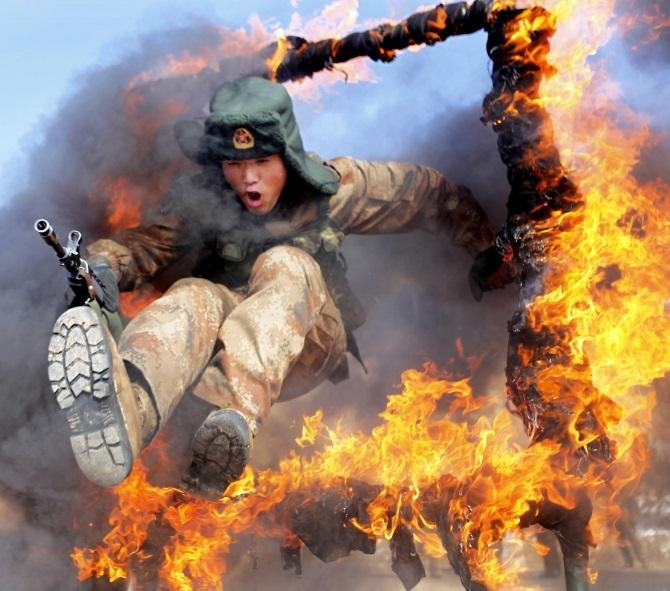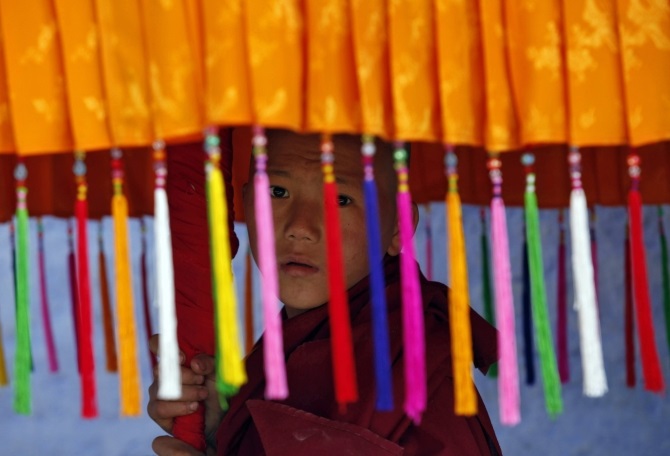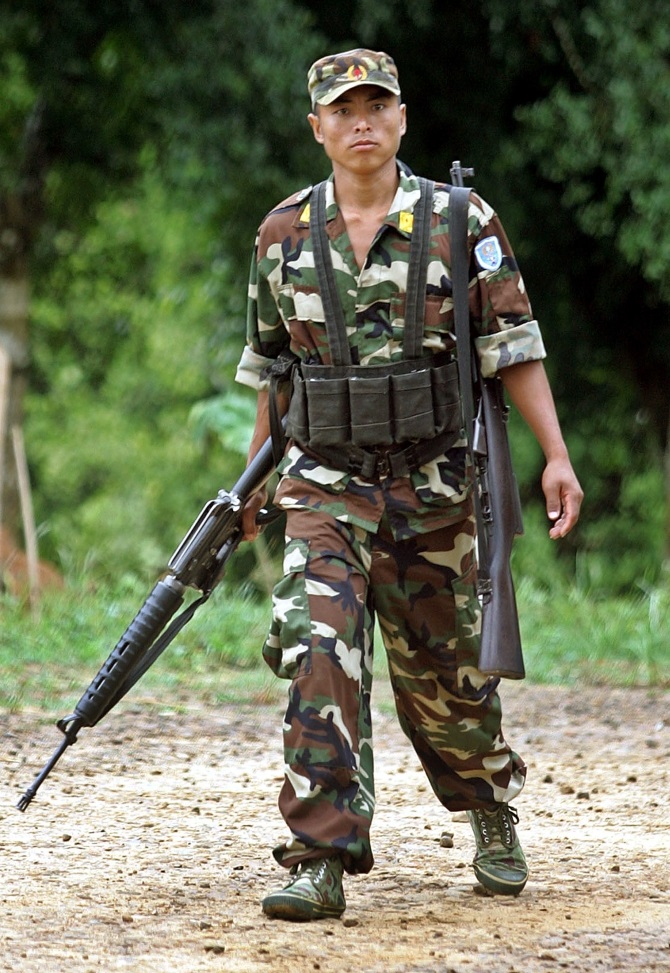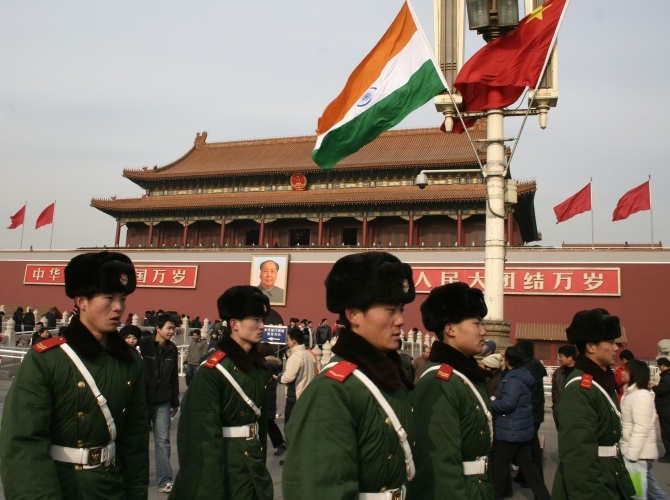
‘Chinese budget for defence is growing by two-digit figures… To add to Indian worry, is Beijing’s collusion with Pakistan.’
‘War is not an option since both India and China are nuclear weapons states.’
‘Sri Lanka is playing the India vs China game to promote its own interest.’
‘China is known to be involved in cyber security threats to India.’
Shishir Gupta, author of The Himalayan Face-off: Chinese Assertion and the Indian Riposte and deputy executive editor with the Hindustan Times, talks to Rediff.com’s Vicky Nanjappa about Chinese incursions, Beijing’s worrying defence budget, the curiosity generated over ties with our neighbours and more.
Tell us about your book The Himalayan Face-off...
The basic trigger for the book is the Depsang incursion, which took place last year when the People’s Liberation Army troopers intruded into Indian territory. In the book, we look at the rise of China in the context of India and what the Indian response is and should be. The story is more about how India sees the rise of an assertive China.
You speak about China’s staggering defence budget. Can you explain more?
To begin with, the United States economy was four times that of China's in the year 2007. In 2012, it was twice the size and now it is only a matter of time before China becomes the largest economy in the world.
The Chinese defence budget has now publicly touched 132 billion dollars with Beijing having a history of fudging the real numbers in defence and internal security. The past three years have seen the Chinese budget for defence growing by two-digit figures and is accompanied by a similar increase in the internal security budget. To add to Indian worry, is Beijing’s collusion with Pakistan, with Chinese workers involved in infrastructure projects in Pakistan Occupied Kashmir
How serious is India about the Chinese threat?
While the defence ministry is worried about the building of Chinese military capacities and capabilities in Tibet and along the border with India, a section on Raisina Hill believes New Delhi is low on Beijing's immediate priorities as it is engaged with Japan over Diaoyu/Senkaku Island dispute and other territorial disputes with Vietnam and Philippines. The transgressions by China across the LAC are on the rise and there is a strong possibility that one of these incidents may turn ugly with the Indian Army now choosing to confront the intruding PLA troopers. The only option that India has is to maintain a working relationship with China or be prepared for the worst.
…

How does China view India?
China has not moved an inch on settling the boundary dispute and continues to impose a cartographical change by claiming parts of Uttarakhand, Eastern Ladakh and all of Arunachal Pradesh or South Tibet. Moreover, China still looks at India through the prism of Tibet.
The flight of the Dalai Lama to India is one of the triggers for the 1962 war. China is building dams on the Brahmaputra and refuses to share historical data on the river. It has a nuclear relationship with Pakistan and is now the main hardware supplier to Islamabad. India must respond by improving its border infrastructure with its enhanced military capacities acting as a deterrent to the PLA.
Is war an option?
No, war is not an option since both are nuclear weapons states. What I am saying is that there is a need to sort out the boundary disputes, have a dialogue on Tibet so that the possibility of an accident is minimised. We need to resolve the boundary issues without imposing any cartographical changes.
How should we approach the Tibet issue with China?
There are 1,20,000 Tibetans in India and I have interviewed the Dalai Lama twice for my book. All the major Tibetan religious leaders live in India. The point is that all the Tibetan monasteries are on the Himalayan belt and if tomorrow China thinks all will be fine on Tibet front after the Dalai Lama then I think they are wrong.
The Dalai Lama is a moderating factor and after him there is a good chance of the hardline radicals causing trouble in these monasteries. The situation could get worse and what would follow will be a problem for both India and China. There is a need for China to re-engage the Dalai Lama in an honest dialogue and get support from India as and when required as New Delhi has no designs on Tibet. There is no harm in talking.
…

China’s interest with all our neighbours is disturbing. Your thoughts…
China is investing in Sri Lanka and Sri Lanka is playing the India vs China game to promote its own interests. On the other hand, Pakistan in its own words has a sweeter than honey relationship with China. China is selling hardware to Bangladesh and in the bargain they have been reaching out to all Indian neighbours and coming into the core concern areas of India. India on the other hand is reaching out to Vietnam, Thailand and South Korea.
What about the Chinese intelligence activity in India?
There is a lot of Chinese intelligence activity, particularly in the northeast region and Indian insurgent groups in northeast are known to get their weapons from Hunan province in China.
The Pakistan-sponsored East Turkestan Islamic Movement has struck China once again. Why does China not act against Pakistan?
China knows clearly that its terrorists come from the Pakistan-Afghanistan arc. The ETIM cadres have known to be trained at FATA and Khyber Pakhtunkhwa. The point is that if you weigh what Pakistan offers to China strategically, which includes a threat to India, they would give priority to Pakistan over these terrorists. China knows it is serious but not on priority terms.
…

What if the Kunming station attack was not staged by the ETIM? What if the same thing had happened and some Tibetans were involved? We would have been blamed by the Chinese for sheltering the Tibetans.
That is why I said that China needs to resolve issues such as Tibet instead of sweeping the real issues under the garb of a 100 billion dollar India-China trade. Beijing needs to come to terms with the security situation both in the Xining region as well as Tibet. For the resolution of Tibet, the demarcation of India-China boundary is the first step.
Will China continue to have the same approach after the attack or will things change?
I feel this would be a game changer since the attack shows the depth of the ETIM. China will have to rethink its strategy on Pakistan and also Afghanistan following this attack. It is a good time for both India and China to cooperate, as they are hit by the same arc. If India and China come together, then, trust me, Pakistan will be able to do nothing.
India complains about hacking by Huawei. Should India ban the telecom giant in India?
We cannot impose a ban based on suspicion. There is the Huawei router incident that I must refer to here, which took place last April. It is still being probed by the National Security Council secretariat.
Basically, it has led to a finding that there was denial or delay in Internet traffic. China is known to be involved in cyber security threats to India. What we need to do is match up to them and build our own capabilities.
Click NEXT for more photo features…
Click on MORE to see another PHOTO feature...